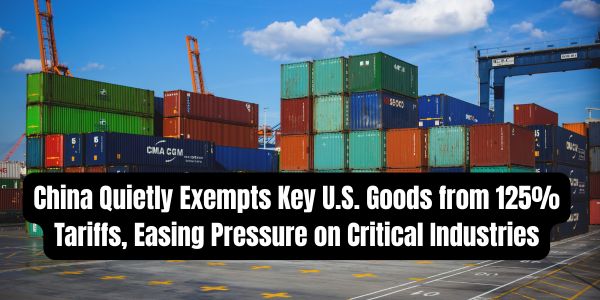Beijing, April 2025 – In a significant but largely unpublicized move, China has quietly exempted several categories of U.S.-made goods from its sweeping 125% retaliatory tariffs, offering relief to critical sectors such as semiconductors, aviation, and medical equipment. The targeted exemptions underscore Beijing’s pragmatic approach to the ongoing trade dispute with Washington, as it seeks to shield vital domestic industries from economic fallout while maintaining leverage in broader negotiations.
Semiconductor Industry Gets Strategic Relief
China has waived tariffs on at least eight integrated circuit-related tariff codes, according to reports from Chinese business magazine Caijing. While memory chips remain subject to duties, the exemptions cover a broad range of semiconductors, reflecting China’s continued reliance on U.S. chip technology despite ambitious efforts to boost domestic production. In 2024 alone, China imported $11.7 billion worth of semiconductors from the United States. The move benefits major U.S. chipmakers such as Intel, Global Foundries, and Texas Instruments, as well as Chinese firms dependent on American chips. Chinese customs authorities have reportedly informed companies that duties paid on these imports between April 10 and 24 will be refunded, although the government has not formally announced the policy and related reports have been swiftly deleted from Chinese media.
Aviation Parts Exemptions Safeguard Industry
China has also excluded critical aviation components-including aircraft engines, nacelles, and landing gear-from its tariff list. This exemption, confirmed by Safran CEO Olivier Andries, is vital for the country’s airlines and its burgeoning domestic aircraft manufacturing sector, which remains dependent on U.S.-made parts. The carve-out ensures continued operation of both foreign and domestically produced aircraft, such as the COMAC C919 and C929, and prevents the kind of supply chain disruptions seen in other markets affected by export controls. The aviation sector’s exemption highlights China’s recognition of its technological dependencies, even as it maintains a tough public stance in the trade war.
Must Read: China Bolsters Military Capabilities Amid Global Tensions
Must Read: Gold Prices Plummet in India as Silver Shines Amid Global Economic Shifts
Medical Equipment Tariff Relief Eases Healthcare Burden
Essential U.S. medical products-including single-use sterile drapes, laparotomy sponges, blood pressure monitors, and fingertip pulse oximeters-have also been granted tariff relief. The exemptions aim to protect China’s healthcare sector, which relies heavily on imported medical technology. On the U.S. side, medical device manufacturers are lobbying for similar relief, warning that tariffs act as a tax on the already burdened healthcare industry. While the Biden administration has extended tariff exclusions for 77 medical products through May 31, 2025, other items like syringes, needles, face masks, and gloves are facing steep tariff hikes, potentially increasing costs for hospitals and healthcare providers.
A Pragmatic Approach Amid Escalating Tensions
China’s selective tariff exemptions signal a calculated effort to minimize domestic economic damage while sustaining pressure on the U.S. in ongoing trade negotiations. By quietly carving out critical sectors from punitive tariffs, Beijing demonstrates a willingness to prioritize stability in key industries over political posturing, even as the broader trade conflict shows little sign of immediate resolution.

